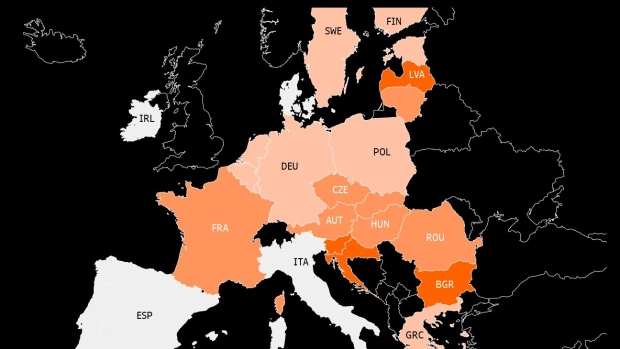Dec 1, 2021
European Firms Skirt Vaccine Mandates as U.S. Pushes Ahead
, Bloomberg News

(Bloomberg) -- U.S. companies, from United Airlines Holdings Inc. to Citigroup Inc., are requiring employees to get vaccinated or risk losing their jobs. The situation looks very different in Europe, even as Covid-19 cases surge anew and governments take an increasingly tough line.
With rules around privacy making corporate “no jab, no job” mandates challenging, many European businesses are using subtler measures to convince workers to get immunized against the coronavirus.
Stellantis NV, the maker of Fiat, Peugeot and Chrysler cars, insists on its U.S. workers getting inoculated, a spokeswoman said. In Europe, it uses a lighter touch, making employees sign declarations that they’re symptom-free or haven’t been in contact with an infected person for two weeks.
“It’s a lot more gentle encouragement,” said Deborah Margolis, a senior associate at labor law firm Littler in London, referring to the European way. “Rather than that sort of heavy-handed approach.”
Almost two-fifths of the 530 European companies in a Littler survey said they’re trying incentives like paid days off and prizes to persuade staffers to get jabbed. Some are opting for anonymous workforce surveys to gauge how many people are vaccinated. Others hand out home Covid tests and rely on employees to report positive results.
The tactics suggest companies in Europe are still grappling with how to safely bring employees back to the office months after vaccines became widely available.
In the U.S., some companies imposing mandates have taken their cue from President Joe Biden. In September, he ordered all individuals supporting government contracts, as well as anyone who works in the same offices as those employees, to get fully vaccinated.
Banking giant Citigroup said in October it would require U.S. staffers to submit proof of vaccination as a condition of their employment, citing Biden’s directive. That stance isn’t feasible in other markets where the lender operates, including London, where staffers are subject to thrice-weekly testing if they come into its offices, but no mandate.
Data protection and employment discrimination rules in Europe mean employers must figure out if they have the legal grounds to collect workers’ vaccination records to safeguard staff, clients and suppliers. While that’s straightforward for nursing homes, it’s harder to establish in areas beyond healthcare.
“They have to be quite careful about asking about vaccine status,” said Rachel Suff, senior policy adviser for employment relations at the Chartered Institute for Personnel and Development. Companies should only do so if they can argue it’s an important health and safety issue, she said.
Some European businesses have taken a tougher line. Air France-KLM, following guidance from the French government, requires valid Covid passports for all public-facing personnel -- meaning employees must either be fully vaccinated or have an up-to-date PCR test.
‘Biblical Costs’
Private equity firm Blackstone and publishing group Bloomsbury announced in October that they’ll allow only inoculated workers to return to their London offices. Blackstone goes further, requiring regular testing even for those who are immunized. Wm Morrison Supermarkets Plc cut sick pay for unvaccinated employees who need to self-isolate, a move to lower the “biblical costs of managing Covid,” Chief Executive Officer David Potts said, according to the Guardian.
Now, with infections spiraling upward and the emergence of the new, potentially faster-spreading omicron variant, companies may get some help from governments. Countries like Austria, Germany and Greece are considering sweeping measures to increase pressure on the unvaccinated.
Austria became the first European country to announce a vaccine mandate for its population. Set to start in February, the policy would mean fines of as much as 3,600 euros ($4,073) for those who refuse to get a shot.
Germany also took a step closer toward making vaccinations compulsory. The incoming chancellor, Olaf Scholz, threw his support behind the move on Tuesday, calling for a parliamentary vote on the matter before the end of the year.
Greece, meantime, announced a rule requiring those over age 60 who are unwilling to be immunized to pay 100 euros a month starting in January.
“It is not a punishment,” Prime Minister Kyriakos Mitsotakis said Tuesday. “I would say it is a health fee.”
Hitting Resistance
There are signs that tougher tactics, though vehemently opposed by some, often work. Earlier this year, immunizations surged in France when the government began requiring proof of vaccination or a negative test for admission to restaurants, bars and other venues. Workers at those businesses must meet those same requirements.
In the corporate world, United Airlines, the first major carrier to require staff to get immunized, now says nearly all its of U.S. workforce is fully vaccinated.
Still, the measures often meet resistance in Europe because of concerns over individual privacy and potential discrimination. In the U.K., even perks like giving employees a paid day off to get a shot may be problematic, said Suff.
“You have to tread a little bit carefully when you’re offering incentives,” she said. “If some people can’t have a vaccination medically, then you could be discriminating against them.”
©2021 Bloomberg L.P.